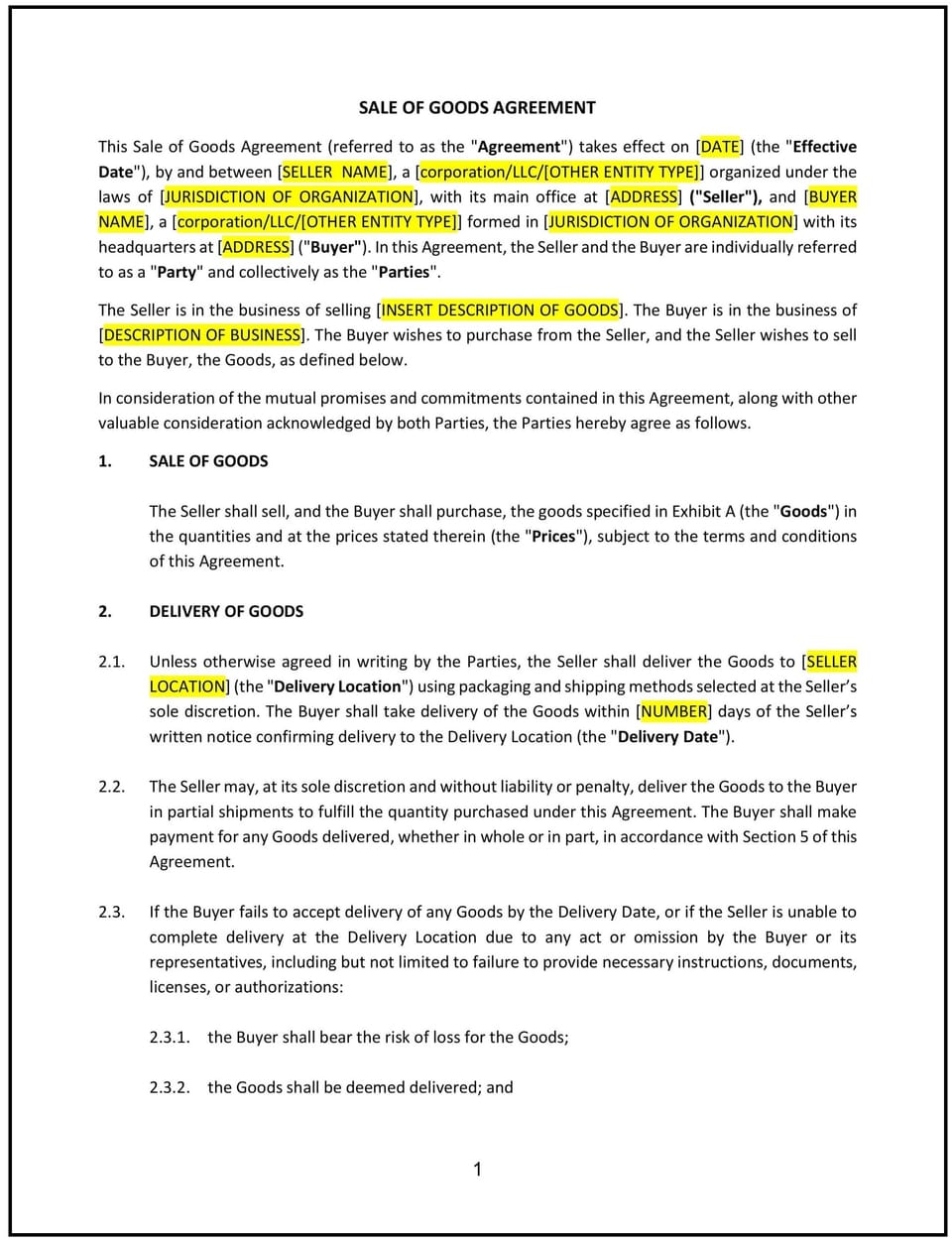Sale of Goods Agreement (Pro-Seller) (Minnesota): Free template

Sale of Goods Agreement (Pro-Seller) (Minnesota)
A Sale of Goods Agreement (Pro-Seller) is a legally binding contract between a seller and a buyer for the sale of goods, with terms that prioritize the seller’s interests. In Minnesota, this type of agreement is commonly used in industries like manufacturing, retail, and wholesale to ensure that sellers are protected from disputes over product quality, payment delays, and liability.
Minnesota’s strong manufacturing sector and proximity to major markets makes it an attractive state for sellers. However, businesses must ensure compliance with state-specific laws, such as Minnesota’s Uniform Commercial Code (UCC) and consumer protection statutes. A well-drafted Sale of Goods Agreement (Pro-Seller) protects the seller’s interests and ensures clarity in the transaction.
For example, a Minnesota-based manufacturer might use a Sale of Goods Agreement (Pro-Seller) to sell machinery to a buyer, while a retailer might use it to sell products to customers. A Pro-Seller agreement is particularly useful for businesses looking to minimize risk and ensure timely payment.
Tips for drafting and maintaining a Sale of Goods Agreement (Pro-Seller) in Minnesota
- Define the goods clearly: Specify the type, quantity, and quality of the goods being sold. For example, include detailed descriptions, specifications, and any warranties or guarantees.
- Include payment terms: Outline the payment structure, payment deadlines, and any penalties for late payments. For instance, specify that payment will be made within 30 days of delivery.
- Address risk of loss: Specify when the risk of loss transfers from the seller to the buyer. For example, state that risk transfers upon delivery to the buyer’s location.
- Include warranty disclaimers: Limit the seller’s liability by disclaiming implied warranties, such as the warranty of merchantability or fitness for a particular purpose. This protects the seller from disputes over product quality.
- Comply with Minnesota laws: Ensure the agreement adheres to Minnesota’s Uniform Commercial Code (UCC) and consumer protection statutes. This ensures enforceability and protects the seller.
- Regularly review and update: Periodically update the agreement to reflect changes in the goods being sold or business needs. For example, if the seller begins offering new products, amend the agreement to include these.
Frequently asked questions (FAQs)
Q: What should a Sale of Goods Agreement (Pro-Seller) include in Minnesota?
A: It should include a clear description of the goods, payment terms, risk of loss provisions, warranty disclaimers, and compliance with Minnesota laws. Additionally, it should specify how disputes will be resolved.
Q: How does Minnesota law impact Sale of Goods Agreements?
A: Minnesota’s Uniform Commercial Code (UCC) governs the sale of goods and emphasizes enforceability as long as the terms are clear and reasonable. Businesses must also ensure compliance with consumer protection statutes.
Q: Can a Sale of Goods Agreement (Pro-Seller) limit the seller’s liability in Minnesota?
A: Yes, a Pro-Seller agreement can include warranty disclaimers and liability limitations to protect the seller from disputes over product quality or performance.
Q: What industries commonly use Sale of Goods Agreements (Pro-Seller) in Minnesota?
A: Industries like manufacturing, retail, and wholesale frequently use Sale of Goods Agreements (Pro-Seller) in Minnesota to protect sellers’ interests.
Q: How can businesses ensure compliance with Minnesota laws in Sale of Goods Agreements?
A: Businesses should work with legal professionals to ensure their agreements comply with Minnesota’s UCC and consumer protection statutes. Regularly reviewing and updating the agreement is also essential to maintain compliance.
This article contains general legal information and does not contain legal advice. Cobrief is not a law firm or a substitute for an attorney or law firm. The law is complex and changes often. For legal advice, please ask a lawyer.


